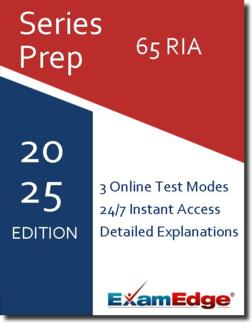FINRA Series 65 Practice Exam & Test Questions - Test Reviews
Based on 20 Reviews
- Real Exam Simulation: Timed questions and matching content build comfort for your Series 65 RIA test day.
- Instant, 24/7 Access: Web-based Series 65 Uniform Registered Investment Adviser Law Exam practice exams with no software needed.
- Clear Explanations: Step-by-step answers and explanations for your Series exam to strengthen understanding.
- Boosted Confidence: Reduces anxiety and improves test-taking skills to ace your Series 65 Uniform Registered Investment Adviser Law Exam (Series65).

FINRA Series 65 Practice Exam & Test Questions - Review
Series 65 Uniform Registered Investment Adviser Law Exam - Reviews
Excellent
Based on
100
reviews
“ The questions in the practice tests were very similar to what was on the actual FINRA Series 65 exam. I liked that you could take a timed test or take a test at my own pace with the ability to review the answers as I go. That really helped me to focus on where I needed to spend more time studying. T ...
Read More
Clovis,H, Port Neches, TX
See why our users from 154 countries love us for their exam prep! Including 20 reviews for the Series 65 RIA exam.
Exam Edge is an Industry Leader in Online Test Prep. We work with our Institutional Partners to offer a wide array of practice tests that will help you prepare for your big exam. No Matter how niche field of interest might be, were here to help you prepare for your test day.
| 2.8M | 4.5M | |
| Users | Tests Taken | |
| 100K | 19 | |
| Unique Exams | Years in Business | |


